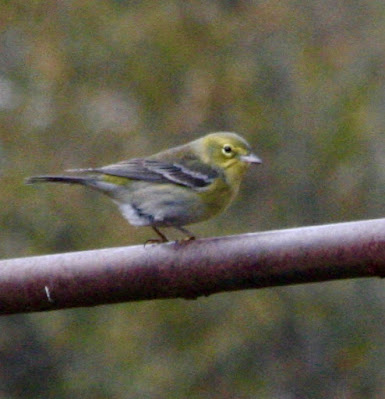A roundup of the week's news of birds and the environment:
One of my favorite winter visitors - the Pine Warbler.*~*~*~*
Dust that billows up from desert storms and arid landscapes is helping to cool the planet and may be obscuring the true extent of global warming caused by fossil fuel emissions.
*~*~*~*
California has suffered years of ongoing drought and even though it has recently received an abundance of snow and rain, it's not enough to make up for the years of drought. But many Californians are trying to find ways to hang onto the recent deluge.
*~*~*~*
A study of southern resident orcas off British Columbia has found that they have appallingly high levels of a "forever chemical" in their bodies.
*~*~*~*
The combined effects of a hydroelectric dam and earth-shifting livestock have altered the landscape in northern Brazil and have upended people's lives there.
*~*~*~*
The largest animal ever to exist on Earth is the blue whale. How did this titanic creature get to be so big?
*~*~*~*
Beavers are famed for building dams, but why do they do it?
*~*~*~*
A recent study has revealed that a fossil flower preserved in amber had been given a mistaken identity for 150 years.
*~*~*~*
Traditional lawns have lost some of their popularity recently because of their lack of biodiversity and their voracious appetite for fertilizer, herbicides, and mowing. Maybe trees are a better option.
*~*~*~*
Here are some amazing wildlife pictures from the past week.
*~*~*~*
'Fairy circles' are a mystery that has puzzled scientists for decades but they may be just a bit closer to solving that mystery.
*~*~*~*
This is a Sprague's Pipit, a bird of the grasslands of North America, and the American Bird Conservancy's Bird of the Week.


It's terribly sad to see photos of the species that are no longer with us. Extinct. It is tragic.
ReplyDeleteI love seeing the occasional Pine Warbler here. Yesterday I was delighted to see a Ruby-crowned Kinglet in my backyard.
The kinglets are indeed delightful. Always busy. I love watching them.
DeleteThanks for the roundup as always, Dorothy. Sorry to be late coming to the party but I am visiting my daughter in Ottawa and we are busy! Right now an eager grandson and an equally eager dog are anxious to go for a walk in the snow. Back to normal next weekend!
ReplyDeleteSnow...oh, yes! I remember that. The white stuff, right? Enjoy your walk and your grandson.
DeleteThe more I read, the more I realize how everything on this planet is connected. We all need each other to survive and thrive.
ReplyDeleteExactly right.
Delete